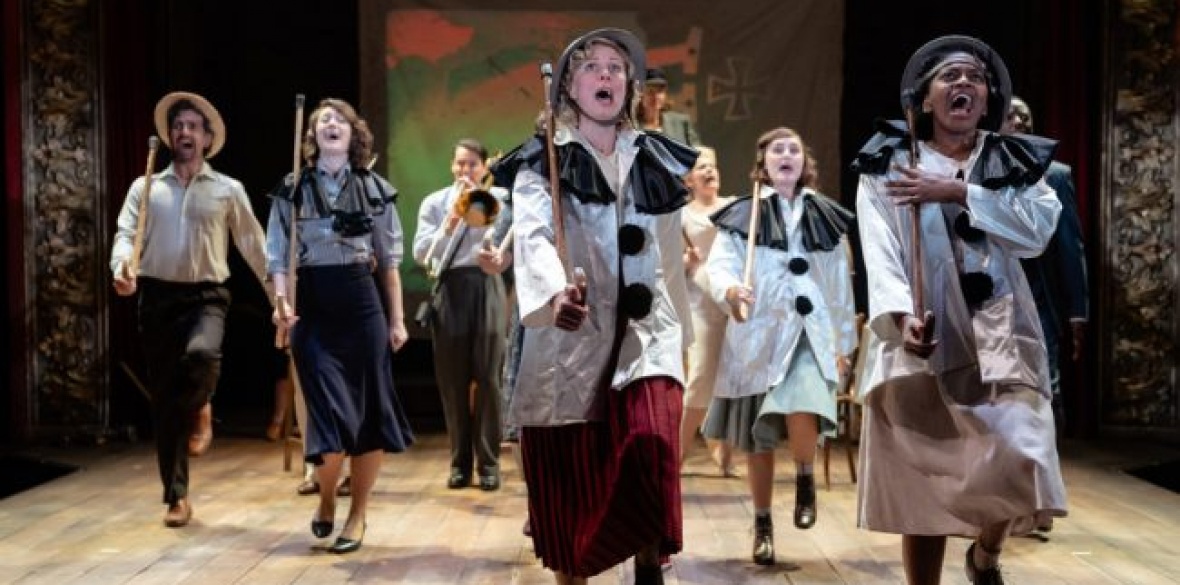This is the last article you can read this month
You can read more article this month
You can read more articles this month
Sorry your limit is up for this month
Reset on:
Please help support the Morning Star by subscribing here
JOAN LITTLEWOOD and Peter Brook are undeniably two of the major directorial influences on modern European theatre, with both in very different ways stretching the boundaries of style, text, themes and processes in performance.
If Brook’s approach is rooted in intellectual inquiry, Littlewood’s concern was essentially entertainment. Sam Kenyon’s lively musical biography Miss Littlewood at the RSC in Stratford-upon-Avon is faithful both to her life and her work and while going full-out to entertain, it conveys the loneliness at the core of her anarchic personality.
Kenyon's show, peppered with songs, takes us from her birth to a working-class, unmarried mother through her early entry into theatre in Manchester agitprop groups, her training at RADA and rejection of its elitist values, to the creation of her Theatre Workshop, eventually finding a home in the Theatre Royal, Stratford East.
We see the triumphant successes, including Brendan Behan’s The Hostage, Shelagh Delaney’s A Taste of Honey and eventually her own Oh! What a Lovely War, along with all the attendant financial and personal crises.
In keeping with Littlewood’s love of popular music-hall theatre, Kenyon conveys her life in short scenes, punctuated by songs, where we see the ever-present Littlewood (Clare Burt) observing and at times acidly commentating directly to the audience.
Her younger self, successively played by other actors, creates, cajoles and bullies her faithful company to produce productions that portray the real world. She contemptuously dismisses theatre more focused on the frame than the picture.
From the talented actors emerging from her theatre, Emily Johnstone’s Barbara Windsor and Sophia Nomvete’s Avis Bunnage present sparkling vignettes and Erica Wyman’s production moves at an energetic pace.
Yet if this engaging show — at its core is her long love story with Jerry Raffles (Solomon Israel), whose practical managerial skills kept the company and Littlewood alive — never quite hits that one big musical number, she surely would have approved, knowing that the audience are well and truly entertained.
Runs until August 4, box office: rsc.org.uk
GORDON PARSONS
THE RENOWNED theatre director Joan Littlewood’s life was motivated primarily by two things — the theatre and the ideas of communism. Growing up in south London, brought up by a single mother in impoverished circumstances and very much aware of the deprivation around her despite attending a Catholic girls’ school, she very early on felt drawn to communist ideals.
I know, because she went to school with my mother. They became friends and both acted together in school plays and both went on to become communists. Littlewood won a scholarship to RADA but the precious middle-class pretensions that characterised the school only frustrated her, so she took herself off, hitching her way up to Manchester.
There she teamed up with Jimmy Miller — later to become famous as Ewan MacColl — and Red Megaphones, his agit-prop theatre group in Salford, which had close ties to the Communist Party.
I had hoped that Miss Littlewood at the RSC would be a celebration of her life and ideas, rather than a half-hearted attempt to echo the music-hall influences that imbued much of her work. The “Miss” in the title sets the tone of its patronising approach and I can imagine what Littlewood would have said to see her life dramatised on the boards of Stratford, in what resembles an amateur dramatic society dance-and singalong: “Fuck that for a joke!”
Littlewood had a healthy disdain for privilege and ruling-class pretension. She felt strongly that her theatre should be rooted in working- class life and provide entertainment and food for thought to a class that rarely if ever had the opportunity to go to the theatre.
She was inspired primarily by Soviet agit-prop theatre and by the great communist theatre practitioners — Bertolt Brecht, Georgio Strehler, director of Milan’s Piccolo Teatro, and Jean Vilar of the Paris-based Theatre National Populaire.
But she developed her own unique way of putting on plays, employing almost exclusively working-class actors, often with little experience if any of performance. She used improvisation and believed strongly in establishing an ensemble, to lend a cohesion and harmony to the performances.
Promoting young unknown playwrights like Brendan Behan, Shelagh Delaney, Frank Norman and the communist Lionel Bart, who went on to fame and fortune with his musical Oliver, she produced plays that no West End theatre at the time would have touched with a bargepole.
Bursting with energy, earthy humour and intellectual stimulus, they were great entertainment, far removed from what many would imagine as heavy socialist polemics devoid of humour. Her politics were embedded in a keen sense of theatricality, fun and the rawness of working-class life that she brought on to the stage.
Unfortunately, this biographical musical neither captures the real hardship of Littlewood’s life and the price she paid for her obsession with theatrical truth, nor does it get anywhere near the essence of why she became such an iconic figure in 20th-century British theatre.
The renowned critic Kenneth Tynan expressed it perhaps better than anyone in his review of her production of her seminal anti-war play Oh! What a Lovely War in 1963. “It seems to me quite likely that when the annals of our theatre in the middle years of the 20th century come to be written, one name will lead all the rest: that of Joan Littlewood.
“Others write plays, direct them or act in them. Littlewood alone ‘makes theatre’.”
JOHN GREEN











